Posts Tagged ‘Ali Saidi Sirjani’
PEN Journey 15: Speaking Out: Death and Life
PEN International celebrates its Centenary in 2021. I’ve been active in PEN for more than 30 years in various positions and now as an International Vice President Emeritus. With memories stirring and file drawers of documents and correspondence bulging, I am a bit of a walking archive and have been asked by PEN International to write down memories. I hope this personal PEN journey might be of interest.
As I wrote holiday cards for the prisoners on PEN’s list this year, I recalled the many cases of writers PEN has worked for over the decades—the successes when writers were released early from prison and the sorrow when they did not survive. The path back for a writer imprisoned for his work is rarely easy, at times has led to exile, but often is accompanied by a mailbag full of cards and letters from fellow writers around the world.
I also sat with PEN’s Centre to Centre newsletters spread around me from 1994-1997, the years I chaired PEN International’s Writers in Prison Committee (WiPC). During that period if a country was mentioned, I knew whether writers were imprisoned there and often knew the main cases as did PEN’s researchers. At the time we published twice a year PEN’s list with brief descriptions of the cases. Proofing paragraph after paragraph of hundreds of situations, I would know without looking when I had moved from one country to another by the punishments given. Lengthy prison terms up to 20 years to life meant I was reading cases from China, but if the writers were suddenly killed either by government or others, I’d moved on to Columbia. In Turkey were pages and pages of arbitrary detentions and investigations and writers rotating in and out of prison.
Names from this period are a kind of ghost family for me, evoking people and a time and place: Taslima Nasrin, Fikret Başkaya, Mohamed Nasheed, Gao Yu, Bao Tong, Hwang Dae-Kwon, Myrna Mack, Ma Thida, Yndamiro Restano, Mansur Rajih, Luis Grave de Peralta, Brigadier General José Gallardo Rodríguez, Koigi wa Wamwere, Eskinder Nega, Tefera Asmare, Liao Yiwu, Ferhat Tepe, Dr. Haluk Gerger, Ayşe Nur Zarakolu, Ünsal Öztürk, İsmail Beşikçi, Eşber Yağmurdereli, Mumia Abu-Jamal, Đoàn Viết Hoạt, Nguyễn Văn Thuận, Balqis Hafez Fadhil, Tong Yi, Christine Anyanwu, Tahar Djaout, Aung San Suu Kyi, Yaşar Kemal, Alexander Nikitin, Faraj Sarkohi, Ali Sa’idi Sirjani, Wei Jingsheng, Chen Ziming, Slavamir Adamovich, Bülent Balta, and many more. Many are now released, a few are even working with PEN, a number have deceased and two of the most celebrated and tragic—Liu Xiaobo and Ken Saro-Wiwa—were executed, one left to die in prison, the other hung.
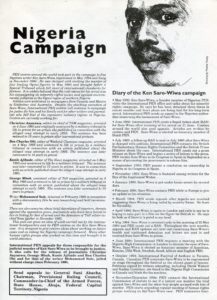
Page 1 of PEN International’s campaign for Ken Saro-Wiwa 1994-1996
In their cases, no amount of mail or faxes or later emails or personal meetings with ambassadors and diplomats changed the course for these writers. A year before Ken Saro-Wiwa’s death, noted Iranian novelist Ali Sa’idi Sirjani died in prison. And years later the murder of Anna Politkovskaya in Russia and the murder of Hrant Dink in Turkey and in 2017 the death in prison of Chinese poet and Nobel laureate Liu Xiaobo all stand out as main cases where PEN and others organized globally but were unable to change the course. I’ll address the case of Liu Xiaobo in a subsequent blog. He was also in prison during the 1990’s but was not yet the global name and force he became.
One of the most noted of PEN’s cases in the mid 1990s was Nigerian writer and activist Ken Saro-Wiwa who was hanged November 10, 1995. Ken understood they would hang him, but PEN members did not accept this. Ken was an award-winning playwright, television producer and environmental activist who took on the government of Nigerian President Sani Abacha and Shell Oil on behalf of the Ogoni people whose land was rich in oil and also in pollution and whose people received little of the profits.
I was living in London when Ken Saro-Wiwa, who had been arrested before for his writing and activism, visited PEN and other organizations in support of the Ogoni cause. PEN took no position on political causes but campaigned for his freedom to write and speak without threat. He met at length with PEN’s researcher Mandy Garner, providing her books and documentation of how he was being harassed in case he was arrested again. When he returned to Nigeria, he was arrested again and imprisoned in May 1994, along with eight others, and charged with masterminding the murder of Ogoni chiefs who were killed in a crowd at a pro-government meeting. The charge carried the death penalty.
PEN mobilized quickly and stayed in close contact with his family. Mandy worked tirelessly on the case, gathering and coordinating information and actions. Ken Saro-Wiwa was an honorary member of PEN centers in the US, England, Canada, Kenya, South Africa, Netherlands, and Sweden so these centers were particularly active, contacting their diplomats and government officials. At PEN International we met with members of the Nigeria High Commission; novelist William Boyd joined the delegation. “I remember sitting opposite all these guys in sunglasses wearing Rolex watches, spouting the government line,” Mandy recalls. We also talked with ambassadors, including from England, the US and Norway to encourage their petitioning of the Abacha government. We met with Shell Oil officials to ask that they intervene to save Ken Saro-Wiwa’s life. PEN USA West also had lengthy meetings and negotiations with Shell Oil. PEN International and English PEN set up meetings in the British Parliament where celebrated writers spoke. English PEN mounted candlelight vigils outside the Nigerian High Commission which writers including Wole Soyinka, Ben Okri, Harold Pinter, Margaret Drabble and International PEN President Ronald Harwood attended. A theater event in London featured Nigerian actors acting out extracts from Ken’s plays and also reading poems from other writers in prison. Taslima Nasreen spoke as well. Ken’s writing was made available to the press which covered the story widely.
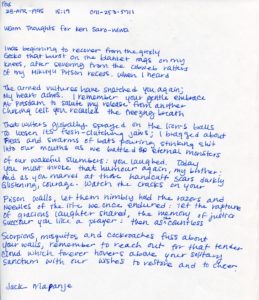
Poem from Malawian poet Jack Mapanje to Ken Saro-Wiwa published on page 2 of PEN Campaign document above
The activity in London mirrored activity at PEN’s more than 100 centers around the globe, from New Zealand to Norway, from Malawi to Mexico. From every continent signed petitions were faxed to the Nigerian government of General Sani Abacha and to the writers’ own governments, to members of Commonwealth nations, to the European Union, the United Nations and to the press calling for clemency for Ken Saro-Wiwa. Through the International Freedom of Expression Exchange (IFEX) of which PEN International was a founding member, the word spread to freedom of expression organizations worldwide. Other human rights organizations including Amnesty and Greenpeace also protested. No one wanted to believe in the face of such an international outcry that the generals in Nigeria, particularly Nigeria’s President Sani Abacha, would kill Ken Saro-Wiwa.
Ken managed to get word out that he was tortured and held in leg irons for long periods of time. He wrote to Mandy, “A year is gone since I was rudely roused from my bed and clamped into detention. Sixty-five days in chains, many weeks of starvation, months of mental torture and, recently, the rides in steaming, airless Black Maria to appear before a Kangaroo court, dubbed a Special Military Tribunal where the proceedings leave no doubt at all that the judgement has been written in advance. And a sentence of death against which there is no appeal is a certainty.”
I moved from London to Washington, DC in late August 1995. When the death sentence was handed down at the end of October, PEN International launched a petition signed by hundreds of writers from around the globe seeking Saro-Wiwa’s and others’ release. For days I tried to get an appointment with the Nigerian Ambassador in Washington. Finally one morning I received a call that I had been given an appointment; however, I was in New York City that morning. Quickly I got a flight back to Washington. En route I called the former PEN WiPC director Siobhan Dowd, who was then heading the Freedom to Write program at American PEN. I asked her to arrange for a second writer to meet me at the Nigerian Embassy. The person didn’t have to say anything, but I wanted a larger delegation.
When I arrived, I was informed the Ambassador had suddenly been called to the U.N. in New York so I met with the number two and three ministers. As I began setting out PEN’s case on behalf of Saro-Wiwa, another woman slipped into the room and sat without speaking but lending ballast to the meeting. Afterwards she and I had coffee, and I briefed her on the case. For the next 25 years Susan Shreve, one of the founders of the PEN Faulkner Foundation, and I have been friends, a friendship that grew out of this tragic event. A few days later I was standing outside the Nigerian Embassy in a vigil, along with representatives from Amnesty and other organizations, when word was sent out to us that Ken Saro-Wiwa had been hanged that morning in Port Harcourt.
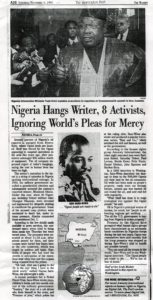
Article from The Washington Post November 11, 1995
The effect of his execution raced through the PEN network and through the human rights and political communities worldwide. The grief was communal. Those who worked on Ken’s case can relate to this day where they were when they heard the news of the execution. The shock was also political. Boycotts were launched against Nigeria. Archbishop Desmond Tutu appeared at a benefit in London for Ken Saro-Wiwa and reported outrage in South Africa over the executions of Saro-Wiwa and the others. He said South African President Nelson Mandela was heading up a campaign to urge the world, especially the US and Western governments to take action. Nigeria was suspended from the British Commonwealth for three years.
Ken’s brother quickly left Nigeria and went to London for a period, sheltering temporarily with British novelist Doris Lessing then relocated in Canada for a time. Ken Saro-Wiwa’s son, Ken Saro-Wiwa Jr., a journalist, also settled in Canada, then in London, then returned and worked for a period in the Nigerian government of Goodluck Jonathan as a special assistant on civil society and international media. He died suddenly in London at age 47 in 2016.
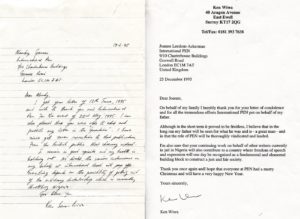
Letter on left from Ken Saro-Wiwa to PEN researcher Mandy Garner. Letter on right from Ken Saro-Wiwa, Jr. to WiPC Chair Joanne Leedom-Ackerman.
The killing of Ken Saro-Wiwa was the beginning of the end for General Sani Abacha, who maneuvered to be the sole presidential candidate in Nigeria’s next election, but died in June, 1998 when he suddenly got ill early one morning and died within two hours, at age 54, the same age as Ken Saro-Wiwa when he was hanged. There were persistent rumors that Abacha had been poisoned, but there was no autopsy and these rumors were never proven.
According to news reports in Lagos, it took five attempts to hang Ken Saro-Wiwa. He was buried by security forces, denying his family the right to bury him. His last words were reported to be: “Lord, take my soul, but the struggle continues.”
Releases of writers PEN worked for that year included Cuban poet Yndamiro Restano freed after serving three years of a ten-year sentence, Cuban journalist Pablo Reyes Martinez freed after three years on an eight-year sentence, Turkish writer Fikret Baskaya freed early and also Unsal Ozturk, freed eight years early, Chinese writer Yang Zhou freed after serving one year of a three-year sentence and Wang Juntao freed after serving five years of a 13-year sentence, Burmese Zargana freed a year early and many others.
“I wish to thank International PEN and the WiPC for all their endeavors on my behalf during the period of my detention. There is no doubt in my mind at all that the powerful insistence and impartial voice of PEN did a lot to win me my freedom from the tyrannical arms of the military dictatorship in Nigeria…”—Ken Saro-Wiwa in fall, 1993 after his earlier detention.
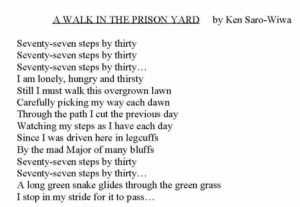
From Ken Saro-Wiwa’s poem “A Walk in the Prison Yard”
Next Installment: PEN Journey 16: The Universal, the Relative and the Changing PEN